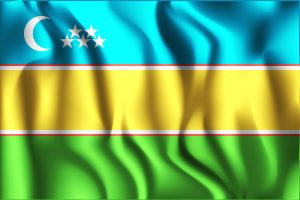A court in Bukhara has sentenced lawyer and journalist Dauletmurat Tazhimuratov to 16 years in prison. Journalist Lolagul Kallykhanova received an 8-year “restricted liberty” sentence, which RFE/RL characterized as “parole-like.” Of the 22 people charged in the case, related to the unrest that broke out in Karakalpakstan’s capital last summer, 16 were sentenced to prison terms between three years and Tazhimuratov’s 16.
The protests in Karakalpakstan, an autonomous republic within Uzbekistan, were sparked last summer after the Uzbek government unveiled proposed changes to the country’s constitution which, among other things, would have altered Karakalpakstan’s status and rights. In early July protests broke out in the region’s capital, Nukus.
As Ildar Daminov explained in an article for The Diplomat in early July 2022:
[The proposed change regarding the political status of Karakalpakstan] means that the current political and legal status of Karakalpakstan would be downgraded to that of a mere province. The proposed amendments would delete the word “sovereign” when mentioning Karakalpakstan, deprive Karakalpakstan of the right to secede, and require that the Karakalpak legal documents be in line not only with the Uzbek Constitution but also with the laws of Uzbekistan. By making such drastic and sweeping changes, the Uzbek government shot itself in the foot.
Tazhimuratov and Kallykhanova publicly called for a “no” vote should such a referendum come. Tazhimuratov reportedly said in an audio recording that made the rounds on social media that he would “personally [go] to a peaceful and legal rally” to demand a referendum on secession from Uzbekistan of such amendments were approved.
On July 1 Tazhimuratov was detained. He’d called on people to attend a July 5 rally in Nukus. Instead, large crowds gathered on July 1 and 2. Although Tazhimuratov was released on July 1, he was detained again the next day. During the unrest, the Uzbek government severed the region’s internet, obscuring the events in the remote region. Amid the government’s effort to suppress the protests, 21 people were reportedly killed, four of them members of the security services.
Uzbek President Shavkat Mirziyoyev flew to Nukus on July 2 and announced that the proposed constitutional changes regarding Karakalpakstan would be removed from the drafts.
In the ensuing months, Tazhimuratov was framed by the government as the main organizer of the unrest that rocked Nukus. Mirziyoyev at one point also suggested nefarious and unnamed “foreign forces” were involved. For most observers, however, it was Tashkent’s fumble that kicked off the unrest.
The protests in Karakalpakstan were an “unforced error on the part of the government,” Jennifer Brick Murtazashvili, of the University of Pittsburgh’s Center for Governance and Markets, told The Diplomat last July. Yuriy Sarukhanyan told openDemocracy that in springing such monumental constitutional changes on Karakalpakstan without prior public discussion, the Uzbek government “created problems where there were none.”
The government’s crackdown on the protests was harsh. Human Rights Watch issued a report in November 2022 noting that Uzbek security forces “unjustifiably” used lethal force to disperse generally peaceful demonstrators on July 1 and 2 in Karakalpakstan. And as Eurasianet, which has covered the trial from Bukhara over the last few months, noted: “No police or National Guard officers are yet known to have been investigated for how they acted in quashing the Nukus protests.”
Instead, the heaviest sentence fell on Tazhimuratov.
The trial was notably open, though not without restrictions. Days after Tazhimuratov complained in court of being tortured, the judge ordered a video feed of the proceedings to be cut. And while an independent commission was formed to investigate the events, many observers have noted the wide berth it has given to the authorities themselves, instead focusing on the civilians arrested by the state.
Meanwhile, the constitutional referendum that triggered the unrest was delayed and little discussed in the months after the unrest in Nukus. In December 2022, however, RFE/RL’s Uzbek service, Radio Ozodlik, reported that the referendum would be scheduled for after the Nowruz holiday, which in 2023 falls on March 21 and 22. The changes to Karakalpakstan’s status will not be included, but it’s clear from the outcome of the trial that Tashkent’s rules reign supreme in the autonomous republic.
































